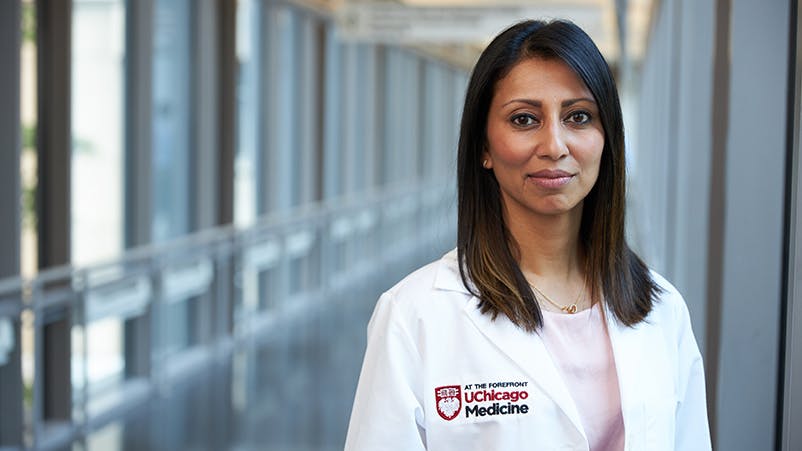Liver Transplantation for Primary and Metastatic Liver Cancer
Hope for Liver Cancer
If you have certain types of cancer in your liver, you may have been told at other hospitals that you cannot have a liver transplant. But there may still be hope.
Transplant Oncology Specialists
At the University of Chicago Medicine, we encourage you to explore all of your options, which may include a liver transplant even if you have different types of cancer in the liver that are not traditionally offered a liver transplant. There is a growing field called transplant oncology, and we are at the forefront of this growth.
At UChicago Medicine, we perform liver transplants on carefully selected patients with several types of liver cancer, including cancers that do not qualify for a transplant at other centers.
A Promising New Option: Liver Transplant Surgery for Metastatic Liver Cancer
Getting a liver on the liver transplant waitlist can be difficult for patients with certain types of cancer in the liver because they do not qualify for extra points (or exception points) from a deceased donor. The best option for such patients is often a living donor liver transplant. Because UChicago Medicine has a robust living donor liver transplant program, you may not have to wait for many months or years on a transplant waitlist if a living donor (such as a relative, friend or an anonymous donor) is able to donate a portion of their liver. Having a living donor transplant also allows you to plan your surgery so you can have the best chance for a successful outcome.
Experts at the UChicago Medicine Liver Tumor Program are considered pioneers in this type of liver transplant. Our surgical team performed the first living donor liver transplant in the United States more than three decades ago. Today, we have expanded this approach to help those with many types of advanced liver cancer.
What Types of Advanced Liver Cancer Can Be Treated with Liver Transplantation?
You may be eligible for a liver transplant at UChicago Medicine if you have:
- Primary liver cancer including:
- Hepatocellular carcinoma (also known as HCC, the most common type representing 85% of all liver cancers)
- Cholangiocarcinoma (bile duct cancer)
- Select other primary cancers (including fibrolamellar cancer and hepatic epithelioid hemangioendothelioma)
- Secondary liver cancer (cancer that has spread to the liver from another organ)
Offering these advanced treatments for patients is part of our mission. We want to help you find the best possible options to improve your quality of life and potentially live longer.
Getting Evaluated for a Liver Transplant at UChicago Medicine
Whether you reach out to us first or want to get a second opinion on your options, we are eager to help you understand what steps you can take next.
A liver transplant is a major surgery that requires significant changes to your lifestyle. That is why we make patient education a priority. At UChicago Medicine, your team of physicians and a dedicated nurse coordinator will work with you to make sure you understand what is involved and that you have adequate support before, during and after your liver transplant.
We also take great care to determine if a liver transplant is the best option for you. Our expert team will determine whether you are a candidate based on several factors. These include:
- The size of your liver tumor
- The number of tumors in your liver and elsewhere
- Your overall health
- Your ability to take care of yourself after surgery
- Other important social and psychological factors
When you come to the medical center, you will have several tests to evaluate your liver, the liver cancer and your overall health. You also will have a comprehensive evaluation with several members of our liver tumor team, including a transplant hepatologist, a transplant surgeon, an oncologist, an interventional radiologist, a radiation oncologist or an advanced therapeutic endoscopist (your providers will be assigned to you based on your type of cancer and specialists that you require). You may also request or be asked to meet with a nutritionist, psychologist or psychiatrist, and a chaplain.
If you are deemed to be a candidate for liver transplant, you will meet other members of our liver transplant team, including a nutritionist, pharmacist, social worker and your transplant nurse coordinator. Your nurse coordinator will help you navigate your treatment plan between your specialists.
We recognize that liver cancer is a complex disease that requires a coordinated plan of care, so our transplant team works in close partnership with your oncology team. Together, we will explain your treatment options and take time to answer any questions you may have.
What to Know About Liver Transplant Surgery for Liver Cancer
What is transplant oncology?
The field of transplant oncology is relatively new, especially in the United States. It involves the use of an organ transplant to treat patients with cancer, in this instance, different types of cancers in the liver.
At UChicago Medicine, our transplant oncology team is one of the most skilled in the Chicago area as well as the nation. While many hospitals do not offer liver transplants to patients with certain types of liver cancer, we aim to make this potentially life-saving treatment more widely available. Our team is involved in collaborative research with other institutions across the country and internationally.
Can cancer patients be on the liver transplant waitlist?
Patients with liver cancer can be added to the national waitlist. However, because there is a limited supply of healthy livers from deceased donors, the waitlist is often long, and patients are prioritized according to how sick they are. And depending on your type of cancer, you may not be ranked high on the list or matched with a liver.
However, a living donor transplant may be an option for you, even if you have advanced liver cancer. This type of transplant allows you to be matched with a donor outside of the deceased donor waitlist at any time.
What is a living donor transplant?
A living donor transplant can be performed when another person (a family member, friend or an anonymous donor) is willing and able to donate a portion of their own liver. In both the living donor and the recipient of the organ, the partial livers will grow and regain normal liver function.
Living donor transplants can be an option for patients with certain types of liver cancer who may not be ranked high on the liver transplant waitlist. This can help them have a higher quality of life and potentially live longer.
Living Donor Liver Transplant for Liver Cancer
At UChicago Medicine, we offer anonymous (directed and non-directed) live liver donation, which may not be available at some centers. Through this process, we match living donors to potential liver transplant candidates. This can increase your chances of finding a donor.
If you are considering this option, our team will explain what you should know about living donor liver transplantation so you understand the process.
Can I get a liver transplant if I am going through chemotherapy or radiation therapy?
Yes, this will depend on the type of cancer you have. At UChicago Medicine, we have designed specific treatment protocols for patients with liver cancer to have a liver transplant from a living donor even if they are going through different types of cancer treatment.
Can liver cancer come back after transplant?
Yes, there is always the chance that the liver cancer may return. The risks depend on the type of cancer and how aggressive it was before initial treatment. At UChicago Medicine, our team will perform a variety of tests, including genomic analysis of your tumor, to determine your risks.
Other risks of having a liver transplant include:
- Organ rejection
- Bleeding
- Infection
- Complications from anesthesia
When you come to UChicago Medicine, our liver transplant team will take the time to explain the risks and benefits of having a liver transplant for advanced liver cancer. They also will answer your questions so you can make the most informed decision about your care.
What other new liver cancer treatments are available or in development?
New treatments for advanced liver cancer available at UChicago Medicine include immunotherapy and targeted drug therapies, as well as new approaches to chemotherapy and radiation therapy. We also offer different types of locoregional therapy including transarterial chemoembolization, transarterial radioembolization, radiofrequency ablation/microwave ablation and stereotactic body radiation therapy (SBRT) for advanced liver cancer. These treatments target tumors directly to preserve as much healthy liver tissue as possible.
Promising research on new treatments for liver cancer is currently underway at UChicago Medicine. Through these clinical trials, we can provide new immunotherapies and a combination of the latest chemotherapies for advanced liver cancer. Many of these treatment options are not widely available elsewhere.
Why should I see the doctors at UChicago Medicine to treat my advanced liver cancer?
Using innovative approaches like liver transplants to treat advanced liver cancer is why patients from all over Illinois and across the country come to our cancer and digestive disease programs, which are ranked among the best in the nation by U.S News & World Report.
Physicians at the UChicago Medicine Liver Tumor Program have a long history of providing innovative care to liver patients. More than 30 years ago, our surgeons performed the first living donor liver transplant.
And because we are designated as a Comprehensive Cancer Center by the National Cancer Institute, we can offer you the latest scientific advances for treating cancer that are not widely available elsewhere.
We believe that our team-based approach to care provides more safe and effective treatment options for advanced liver cancer. Even if you were told that a transplant would never be possible for you, we may be able to help. Please contact us at 1-855-702-8222.
Liver Cancer Treatment
The UChicago Medicine Liver Tumor Program brings together specialists from our cancer and digestive disease programs to provide care for patients with primary liver cancer as well as bile duct cancer and benign tumors of the liver.
Learn more about liver cancer careRequest an Appointment
You can also make an appointment with our providers by:
– Requesting an online second opinion from our specialists
To speak to someone directly, please call 1-888-824-0200. If you have symptoms of an urgent nature, please call your doctor or go to the emergency room immediately.
* Indicates required field
Meet Our Team of Specialists

Gastroenterology

Transplant
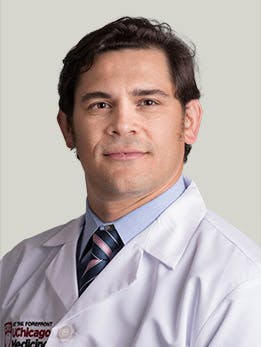
Transplant

Hematology and Oncology (Cancer)
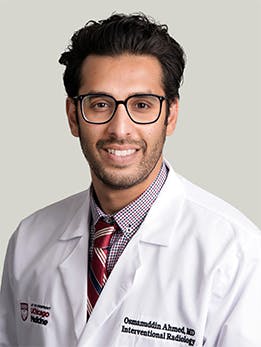
Radiology
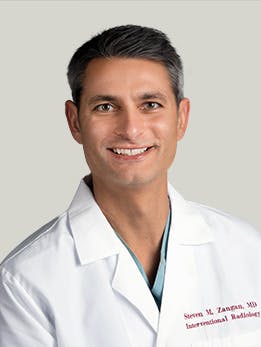
Vascular and Interventional Radiology

Surgery

Gastroenterology

Radiology
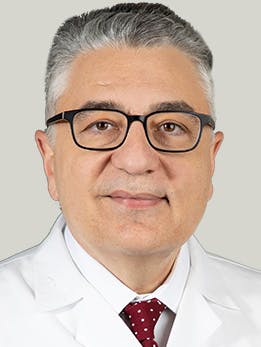
Radiology
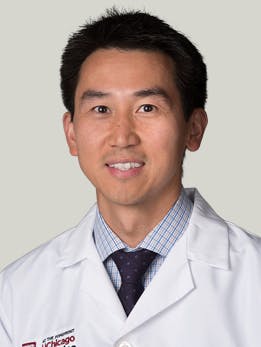
Radiation Oncology
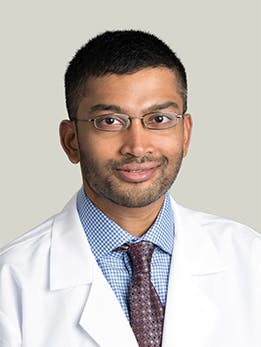
Radiation Oncology
Help When Traveling from Outside the Chicago Area for Medical Care
For Logan Andrews and his family, traveling from North Carolina to Chicago for Logan's heart and liver transplant care required special assistance beyond medical expertise. The family turned to the Destination UChicago Medicine team to help scheduling appointments, arranging travel and finding accommodations.
Logan Andrews is a typical young man. You wouldn't know by looking at him that he recently had a heart and liver transplant.
I was born with a congenital heart defect called hypoplastic left heart. And so the left pulmonary artery is not equal to the right. I had a very different experience from the kids I grew up with. I was very limited to sports. I didn't exactly go out and be the all-star football player. I was very to myself most of the time. I did play baseball for a couple of years, which was fun.
Hypoplastic left heart syndrome is a serious condition that damaged Logan's liver. He needed a new heart and a new liver. But the family lives in North Carolina, a long way from UChicago Medicine and its top notch transplant team. That's where the Destination UChicago Medicine team proved to be such a tremendous asset.
Destination UChicago Medicine is a program that was implemented to help our out-of-state patients and those who travel from a far distance. It also is a place where people who have longer stays can come in and gather resources. Primarily, we assist with scheduling appointments, navigation throughout the medical center, hotel and transportation options, and then any pre- and post-follow-up questions that may arise.
The team really goes over and beyond for our patients. I mean, some of them can be just as close as Kankakee, or they could be as far as New Mexico. And the team is just phenomenal how they go over and beyond for every single one of our patients just to give that high-touch service.
Destination UChicago Medicine has been working with Logan's family for years. He had multiple hospitalizations and surgeries. So when the family got the great news they were finally on the transplant list, they called Kimberly.
She called the office, and she stated, I just have to share this with you because I feel like you've been a part of this process with my family. And we both cried. I was so overjoyed. I can hear the joy in her voice, and it was like, wow, this has finally happened after many years. This has been a journey for them.
Patients are usually referred by physicians or care teams. Destination UChicago Medicine works with hotels and organizations that help with long-term housing for patients' families. They also have navigators who help patients work their way through a very complex system.
Very important, and actually it helps out a lot. I know that living in big cities like this is not always manageably affordable sometimes. So this program's really helped us out a bunch. And we really thank you all for that.
Logan had his transplant last October and is doing well. He wants to study marketing and live a full life.
Have my own family one day. And just live life and enjoy it, and do things that I couldn't do before surgery.
[MUSIC PLAYING]
Q & A: What you need to know about liver cancer
Anjana Pillai, MD, a gastroenterologist and transplant hepatologist who specializes in the management of chronic liver diseases, answers questions about liver cancer and treatment of the disease.
